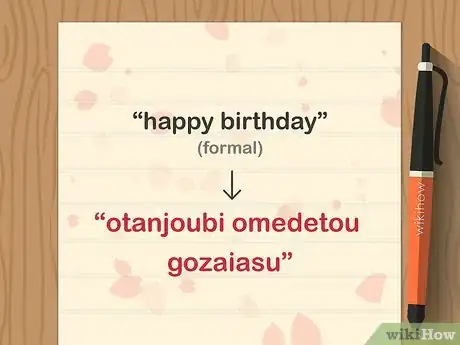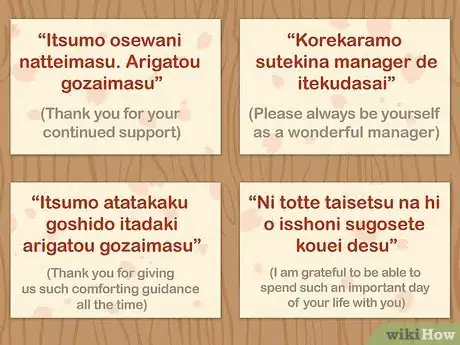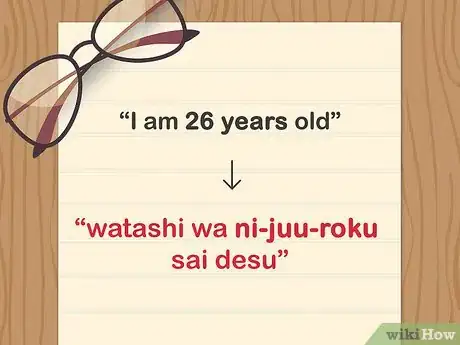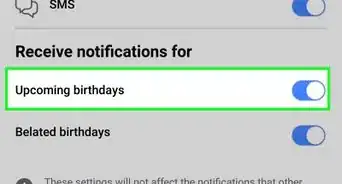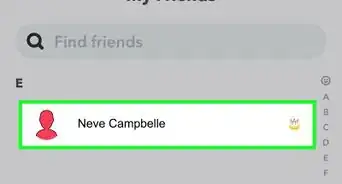This article was co-authored by wikiHow staff writer, Jennifer Mueller, JD. Jennifer Mueller is a wikiHow Content Creator. She specializes in reviewing, fact-checking, and evaluating wikiHow's content to ensure thoroughness and accuracy. Jennifer holds a JD from Indiana University Maurer School of Law in 2006.
There are 9 references cited in this article, which can be found at the bottom of the page.
wikiHow marks an article as reader-approved once it receives enough positive feedback. In this case, several readers have written to tell us that this article was helpful to them, earning it our reader-approved status.
This article has been viewed 1,004,938 times.
Learn more...
The idea of celebrating your birthday on the actual day of your birth is relatively new in Japan. Until the 1950s, all Japanese birthdays were celebrated over the new year. However, as Japanese culture became more influenced by Western culture, the idea of the individual birthday took on more significance. If you want to say "happy birthday" in Japanese, you would typically say "otanjoubi omedetou gozaimasu." If the person is close to you, leave off the "o" and the "gozaimasu," which are considered more formal, and say simply "tanjoubi omedetou."[1]
Steps
Offering Birthday Wishes
-
1Say "otanjoubi omedetou gozaimasu" to be polite. "Otanjoubi omedetou gazaiasu" means "happy birthday." However, the "o" before "tanjoubi" indicates politeness and respect. The word "gozaimasu," which means "many," is also considered more formal. Use this phrase when you're speaking to a stranger, someone older than you, or someone in a position of authority, such as a teacher or your manager at work.[2]
- The phrase is written お 誕生日 おめでとう ございます.
- A literal translation of this phrase would be "many congratulations on your birthday."
Tip: Even though the word "gozaimasu" is considered relatively formal, it's still included in written birthday greetings, even if you're writing to a close friend.
-
2Switch to "tanjoubi omedetou" for close friends. If you're talking to close friends or people younger than you, feel free to dispense with the formalities and simply say "tanjoubi omedetou" (誕生日おめでとう) for "happy birthday."[3]
- Young people may speak even more casually with each other, saying "happy bazde" ( ハッピーバースデー) to each other. This greeting is basically just a collection of Japanese syllables that sounds like "happy birthday" in English.[4]
Tip: "Omedetou" (おめでとう) means "congratulations." You can use this word by itself to wish someone a happy birthday or to congratulate them on other celebratory occasions.
Advertisement -
3Add an expression of gratitude for authority figures. If you're wishing a happy birthday to someone who has authority over you, such as a teacher or your boss at work, it's common practice in Japanese culture to also thank them for their presence in your life. Some phrases you can use include:[5]
- "Itsumo osewani natteimasu. Arigatou gozaimasu." (Thank you for your continued support.)
- "Korekaramo sutekina manager de itekudasai." (Please always be yourself as a wonderful manager.)
- "Itsumo atatakaku goshido itadaki arigatou gozaimasu." (Thank you for giving us such comforting guidance all the time.)
- "Ni totte taisetsu na hi o isshoni sugosete kouei desu." (I am grateful to be able to spend such an important day of your life with you.)
-
4Add a name or relationship to personalize your greeting. If you're celebrating the birthday of a close friend, family member, or significant other, you may want to draw attention to your relationship in your birthday wish. Some options are:[6]
- "Shinyu-no anatani, otanjo-bi omedetou." (Happy birthday to my best friend.)
- "Aisuru anatani, otanjo-bi omedetou." (Happy birthday, my love.)
Talking about Age
-
1Use "anata wa nansai desu ka" to ask someone how old they are. [7]
- If you want to be even more casual, you can simply say "nansai desu ka." On the other hand, if you're talking to someone older than you or in a position of authority and want to be more formal, you would say "toshi wa ikutsu desu ka."[8]
-
2Respond with your age by saying "watashi wa," then your age, followed by "sai desu." Counting in Japanese is fairly easy to master. If you can count to 10 in Japanese, you can form any number. Use that number for your age.[9]
- For example, if you're 26 years old, you would respond "watashi wa ni-juu-roku sai desu."
- If you were asked with the more casual "nansai desu ka," you can simply respond with your age followed by "sai desu ka."[10]
Tip: Age can be a sensitive subject. If you don't want to answer the question, you can just say "chotto." This word means "little" in Japanese, but in this context, it's taken to mean that you're not comfortable answering the question. You could also joke "mo tosh desu," which essentially means "too old!"
-
3Express your birthday using the Japanese calendar. If you want to potentially impress a Japanese person who asks your age, you can answer them with reference to the Japanese calendar. If you were born between 1926 through 1988, you were born in the Showa era. If you were born between 1989 and 2019, you were born during the Heisei era. The year you were born translates into a number of year in the era, which in turn you can use to express how old you are.[11]
- For example, suppose you were born in 1992. The Heisei era started in 1989, so you were born in the fourth year of the Heisei era. Your age is "Heisei 4."
Japanese Birthday Traditions
-
1Recognize the special birthdays in Japanese culture. Every culture has particular birthdays that are considered more important than others. In Japan, the 3rd, 5th, and 7th birthdays have particular significance for children. There are also several aging milestones that are significant for older people. Some of these special birthdays include:[12]
- Shichi-go-san (七五三): A festival for girls when they reach the ages of 3 and 7, or boys when they reach the age of 5.
- Hatachi (二十歳): The 20th birthday, when Japanese young people become adults.
- Kanreki (還暦): The 5 cycles of the Chinese zodiac are complete when a person turns 60 and they are said to be reborn. The birthday celebrant wears a sleeveless red jacket that represents a return to the beginning of life.
-
2Celebrate the start of adulthood at 20. If you're American, you may celebrate 18 as the year you enter adulthood and can vote, or 21 as the year when you can legally drink alcohol. In Japan, all of these things come to pass at the age of 20, and a large, formal celebration is held in the hometown of the birthday celebrant.[13]
- The festivities begin with the birthday celebrant in a formal kimono, although they may change into more casual clothes later.
- The party and feast are prepared by the parents. This is typically the last such ceremony the parents will give to their children apart from their wedding.
-
3Plan to have the birthday party a few days before the actual birthday. The Japanese have adopted many Western birthday customs, including having a big birthday party for the family, friends, and coworkers of the birthday celebrant. The party is usually planned by a family member, significant other, or close friend. Because someone's actual birthday is traditionally spent privately, the larger party is typically held a few days earlier.[14]
- While the person having the birthday may be in on the planning of the birthday party, in Japanese culture they typically aren't responsible for paying for the party, inviting guests, or arranging other details.
- The birthday party doesn't have to be elaborate. It often consists of a group of friends taking the birthday boy or girl out for dinner to celebrate, perhaps at a favorite restaurant.
Culture Tip: The Japanese place less emphasis on the individual than most Western cultures. As a result, some Japanese people may not be comfortable being the center of attention at a large birthday party. Ask them before you start planning an elaborate celebration.
-
4Go on a date for your significant other's birthday. If you're in a romantic relationship with someone who is Japanese, traditionally it's your responsibility to plan a date on their birthday. While they may have a party a few days before, their actual birthday is a more intimate occasion spent solely with their significant other.[15]
- As with the birthday party, the date doesn't have to be elaborate. Many Japanese couples are content simply to spend time together without the intrusion of outside pressures.
Community Q&A
-
QuestionHow do I write 'mum and dad'?
 Community AnswerFormally, it would be お母さん(Mother) と(and) お父さん(Father). This is pronounced Okaasan and Otousan. You can also use はは for Mom and ちち for Dad in informal situations. This is pronounced Haha and Chichi.
Community AnswerFormally, it would be お母さん(Mother) と(and) お父さん(Father). This is pronounced Okaasan and Otousan. You can also use はは for Mom and ちち for Dad in informal situations. This is pronounced Haha and Chichi. -
QuestionHow do I say "I love you" in Japanese?
 Community AnswerYou can say "daisuki" for friends and people you like, "aishiteru" in a more serious relationship, and "koishiteru" to the person that you want to spend the rest of your life with.
Community AnswerYou can say "daisuki" for friends and people you like, "aishiteru" in a more serious relationship, and "koishiteru" to the person that you want to spend the rest of your life with. -
QuestionHow do I say happy birthday in Japanese?
 Community AnswerTanjobi Omedeto Gozaimasu.
Community AnswerTanjobi Omedeto Gozaimasu.
References
- ↑ https://www.kanpai-japan.com/learn-japanese/happy-birthday
- ↑ https://www.livinglanguage.com/community/discussion/947/how-to-say-happy-birthday-in-japanese
- ↑ https://www.livinglanguage.com/community/discussion/947/how-to-say-happy-birthday-in-japanese
- ↑ https://www.kanpai-japan.com/learn-japanese/happy-birthday
- ↑ https://blogs.transparent.com/japanese/7-best-happy-birthday-wishes-for-your-boss-in-japanese/
- ↑ https://blogs.transparent.com/japanese/how-to-say-happy-birthday-in-japanese/
- ↑ http://japanese-phrases.sakura.ne.jp/page105j.html
- ↑ http://www.iheartjapan.ca/2010/11/saying-how-old-your-are-in-japanese/
- ↑ http://japanese-phrases.sakura.ne.jp/page105j.html
- ↑ http://www.iheartjapan.ca/2010/11/saying-how-old-your-are-in-japanese/
- ↑ http://www.iheartjapan.ca/2010/11/saying-how-old-your-are-in-japanese/
- ↑ https://www.sljfaq.org/afaq/special-birthdays.html
- ↑ https://www.tsunagujapan.com/10-japanese-traditional-rituals-to-give-every-child-a-happy-life/
- ↑ https://www.tofugu.com/japan/japanese-birthday/
- ↑ https://www.tofugu.com/japan/japanese-birthday/
About This Article
To say "happy birthday" to your friends and family in Japanese, say "tanjoubi omedetou," which is pronounced like "tan-joh-bee oh-meh-de-toh." If you want to wish a happy birthday to someone in a formal setting, like a teacher or an elder, say "tanjoubi omedetou gozaimasu," pronounced like "tan-joh-bee oh-meh-de-toh goh-za-i-mahs." You can say "Shinyu-no anatani, otanjo-bi omedetou" if you want to say happy birthday to your best friend. To customize the phrase for a significant other, try "Aisuru anatani, otanjo-bi omedetou," which means "Happy birthday, my love." To learn how to say other celebratory phrases in Japanese, keep reading!
